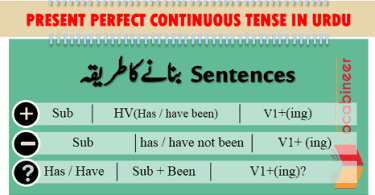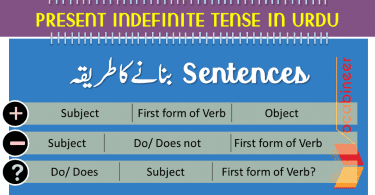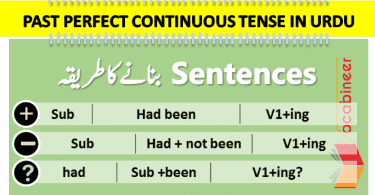Learn the Future Perfect Tense with simple explanations, examples, and Urdu translations. This guide helps you understand its uses in daily conversations and provides practical exercises to reinforce your learning.
Part of a complete Tenses guide, this resource is ideal for Urdu speakers looking to improve their English grammar. Whether you’re taking an English speaking course or learning independently, this lesson will help you master the Future Perfect Tense easily and effectively. Start now to enhance your language skills!
In This Page
Future Perfect Tense in Urdu
:پہچان
چکا ہوگا، چکی ہوگی، چکے ہوں گے۔
Helping Verb
Uses two auxiliary verbs ‘will’ & ‘have’.
‘Will’ is often replaced by ‘be going to’
| He, she, it | Will have |
| I, we, you, they | Will have |
Transformations
Affirmative:
| Sub | HV | V3 (Past Participle) |
Interrogative:
| Will | Sub | have | V3 | Object (depends)? |
Negative:
| Sub | Will not | Have | V3 | (Depends). |
Interrogative and negative:
| Will | Sub | not | have | V3 | Object (depends)? |
Examples:
By 2020, many companies will have moved to their work to online service.
You may replace ‘will’ with ‘be going to’
| Is/am/are | Going to have | PP(past participle) |
By 2020, many companies are going to have moved to their work to online service
Example sentences with Urdu:
Positive sentences
| English Sentence | Urdu Translation |
|---|---|
| He will have finished his work. | وہ اپنا کام مکمل کر چکا ہوگا |
| You will have made a new chair. | تم نے نئی کرسی بنا لی ہوگی |
| She will have decorated her home. | وہ اپنا گھر سجا چکی ہوگی |
| I will have bought a computer. | میں ایک نیا کمپیوٹر خرید چکا ہوں گا |
| They will have shifted to a new home. | وہ ایک نئے گھر میں منتقل ہو چکے ہوں گے |
| Students will have passed the examination. | طلبا امتحان پاس کر چکے ہوں گے |
Negative sentences
| English Sentence | Urdu Translation |
|---|---|
| He will not have finished his work. | وہ اپنا کام مکمل نہیں کر چکا ہوگا |
| You will not have made a new chair. | تم نے نئی کرسی نہیں بنا لی ہوگی |
| She will not have decorated her home. | وہ اپنا گھر نہیں سجا چکی ہوگی |
| I will not have bought a computer. | میں ایک نیا کمپیوٹر نہیں خرید چکا ہوں گا |
| They will not have shifted to a new home. | وہ ایک نئے گھر میں منتقل نہیں ہو چکے ہوں گے |
| Students will not have passed the examination. | طلبا امتحان پاس نہیں کر چکے ہوں گے |
Interrogative sentences
| English Sentence | Urdu Translation |
|---|---|
| Will he have finished his work? | کیا وہ اپنا کام مکمل کر چکا ہوگا؟ |
| Will you have made a new chair? | کیا تم نے نئی کرسی بنا لی ہوگی؟ |
| Will she have decorated her home? | کیا وہ اپنا گھر سجا چکی ہوگی؟ |
| Will I have bought a computer? | کیا میں ایک نیا کمپیوٹر خرید چکا ہوں گا؟ |
| Will they have shifted to a new home? | کیا وہ ایک نئے گھر میں منتقل ہو چکے ہوں گے؟ |
| Will students have passed the examination? | کیا طلبا امتحان پاس کر چکے ہوں گے؟ |
Future Perfect Tense Uses
Use_1
Completed Action before Something in the Future
اگر ہم مستقبل کسی خاص وقت سے متعلق سوچ یا بات کر رہے ہوں اور اس سے پہلے کوئی کام مکمل ہو چکا ہو تو ہم “فیوچر پفیکٹ ٹینس “یوز کرتے ہیں۔
Examples:
- By next November, I will have received my promotion.
- By the time he gets home, she is going to have cleaned the entire house.
- I am not going to have finished this test by 3 o’clock.
- Will she have learned enough Chinese to communicate before she moves to Beijing?
- Ali is probably going to have completed the proposal by the time he leaves this afternoon.
- By the time I finish this course, I will have taken ten tests.
- How many countries are you going to have visited by the time you turn 50?
Use_2
Duration before Something in the Future (Non-Continuous Verbs)
With Non-Continuous Verbs and some non-continuous uses of Mixed Verbs, we use the Future Perfect to show that something will continue up until another action in the future.
Examples:
- I will have been in London for six months by the time I leave.
- By Monday, Susan is going to have had my book for a week.
NOTE!
The words “live,” “work,” “teach,” and “study” are sometimes used in this way even though they are NOT Non-Continuous Verbs.
In case of using the time expressions below; use Present perfect instead of Future Perfect.
When, while, before, after, by the time, as soon as, if, unless, etc.
Examples:
- I am going to see a movie when I will have finished my homework. Not Correct
- I am going to see a movie when I have finished my homework. Correct
Adverb Placement
Place the adverb just after the ‘will’ and ‘be (is/am/are)’ in affirmative sentences and just after the subject in interrogative sentences.
- You will only have learned a few words.
- Will you only have learned a few words?
- You are only going to have learned a few words.
- Are you only going to have learned a few words?
Read More
- Present Continuous Tense
- 50 Proverbs Meaning In Urdu
- Imperative Sentences Examples with Urdu
- Phrasal Verbs list H in Urdu




